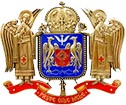

Speech of His Beatitude DANIEL, Patriarch of the Romanian Orthodox Church, at the opening of the CROCEU (Committee of the Orthodox Churches' Representatives to the European Union) meeting, Bucharest, 16 May 2014:
We joyfully welcome all participants in this event and thank you for your interest in the dialogue between the European Institutions and Churches in Europe which, through the TreatyofLisbon, has received an important legal foundation. Today's seminar actually opens the meeting of Representatives of the Orthodox Churches to the European Union. This shows the willingness and openness of the Orthodox Churches to promote an open, transparent, constant and responsible dialogue, in strengthening European solidarity and unity.
The theme of the meeting is an appropriate choice, because this year, 2014, marks the 20th anniversary of the International Year of the Family and yesterday, on the 15th of May, the Family Day (Both were proclaimed by the United Nations General Assembly) was celebrated worldwide. These anniversaries are a good opportunity to promote family values and a just understanding of the challenges it faces in the societies we are living today. However, the choice of this theme shows above all the care, responsibility, appreciation and especially the support that the Church gives to the family facing multiple challenges and multiple crises in society today. That is because, both in Romania and throughout Europe, the Christian family is facing an economic crisis (poverty, unemployment, uncertainty of the future, emigration etc.), a moral crisis (libertinism, abortion, divorce, abandonment of children, domestic violence, juvenile delinquency, human trafficking etc.), and a spiritual crisis (sectarianism, fanaticism, religious proselytism etc.). The family is also in a fragile and difficult situation because the traditional family model itself is considered by some to be outdated or obsolete. We live in a context dominated by an individualistic and secularizing mentality, not seeking holiness of life through prayer, the birth of children and their upbringing in the Christian faith.
Today there is an increasing number of those who treat marriage as a simple contract or partnership between two people of different genders or of the same gender. But social partnerships or cohabitation between persons cannot be equal to the traditional family and any attempt against its traditional identity is an artificial innovation which cannot bear the name of the natural reality from which is departing. Therefore, the dilution of traditional family values or the removal of differences between this family and other types of unions, in the name of human rights and equality, undermine the natural family as the foundation of human society. Hence, the traditional family has the right and duty to protect its own identity, dignity and continuity. Reflecting on the current crisis of the family, we must not forget that the family is first of all a gift of God-the Creator to humanity. Although it has gone through many trials and dangers that affected the human society, the family remained the most stable institution of humanity, ensuring its continuity in history. Secondly, we must support efforts of Churches to protect the natural, traditional, universalfamily and resist some new family "models" which consider that natural male-female union would be only a model among others. Thirdly, it is necessary to intensify cooperation between Church and State in all matters concerning the social, educational and cultural importance of the family because the Christian matrix of Europe is a constituent part of its identity, even if it is sometimes overlooked today. Fourthly, the European Union should give more support to the family, because a diminishing birthrate, the aging of the population, family instability, abandonment of children and youth unemployment have a negative spiritual, social and economic impact on Europe as a whole. Helping families in overcoming the crisis today and providing support for young married couples should be an ongoing priority of the European social policy. The family itself is a paramount value that Europe must defend and promote since it is the foundation of the existence and continuity of the European society, her souland her hope. The brilliant idea of the founding fathers of a united Europe, as being a "big European family", urges us to affirm that, without the natural or traditional European family, the very existence of the European Union cannot be promoted as a big family of European citizens from different peoples, based on responsibility, mutual respect, loyalty and solidarity, unity and hope. It is significant that, for us Christians, the essential terms of the spiritual life of the Church, such as father, son and daughter, brother andsister are taken from the natural conjugal family, especially in the Pauline and Johannine terminology of the New Testament. Being the foundation of the existence, stability and continuity of the European society, of maturing the love of parents and of good education for children, of spiritual health and material prosperity, the natural human family cannot be replaced by any substitute or artificial model. At the same time, the family cannot be reduced to its biological, legal, psychological, sociological or economic aspects, because it is more than all these together and transcends them. For the Christian tradition and all the monotheistic religions, the family is a sacred reality, the fulfillment of the human being in a state of communion of generous love, having the holy vocation to be the living cooperation of human beings with God, the Creator of natural terrestrial life, in order to attain eternal, heavenly life, in the everlasting love of God.
† DANIEL Patriarch of the Romanian Orthodox Church